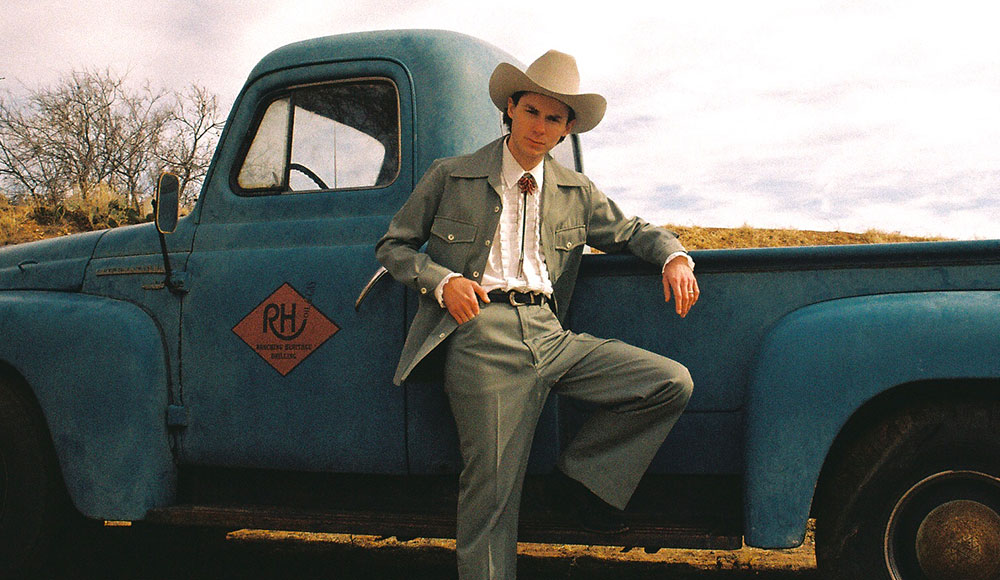Given his start, it’s remarkable that John Fahey, the rebellious acoustic guitarist whose 1959 Blind Joe Death debut album took more than three years to sell 100 copies, would go on to influence generations of solo acoustic players with his “American Primitive Guitar” style.
Among them is Hayden Pedigo, a Texas panhandle native whose intricate fingerpicking, ambient soundscapes and open-tuned compositions follow in the footsteps of the solo acoustic pioneer.
But there are other sides to Pedigo. Lots of them, in fact.
Pedigo has, for instance, been known to incorporate elements of drone and ambient music and ’70s art-rock into his compositions. He’s collaborated with luminaries like This Heat’s Charles Hayward and Faust’s Zappi Diermaier. He’s been depicted as a corpse-painted gasoline attendant on the cover of Let It Go, the first album in his “Motor Trilogy.”
Pedigo is also the subject of Kid Candidate, a documentary that premiered at the South By Southwest Music Conference in Austin about his unlikely attempt to run for Amarillo City Council at the age of 24. It’s a subject that comes up in nearly every interview he does.
We caught up with Pedigo between stops on his current tour promoting his 2025 album, I’ll Be Waving As You Drive Away, which Paste magazine called “a total and affectionate rewrite of what instrumental music could and ought to be.” Delivered in a self-deprecating Southern cadence, Pedigo spoke about living in the middle of nowhere, recording with the nihilistic noise band Chat Pile, and using silence as a weapon.
Let’s start with John Fahey and Leo Kottke. When did you first hear them, and what would your music sound like if you hadn’t?
HAYDEN PEDIGO: Well, Leo Kottke was the first one I heard, back when I was 14. My mom had, for some reason, a copy of Leo Kottke’s greatest hits that I found in the cabinet under the TV. I think she bought it as a gift for my grandfather, but I guess he didn’t listen to it. By that point, I was already a fan of Ry Cooder. So it was Ry Cooder, Leo Kottke, and then I found John Fahey mentioned in the liner notes of the Kottke CD. And once I found Fahey, it was like off to the races for me. I really dove into the finger picking headfirst. I just preferred his writing and playing style over Leo Kottke’s.
Tell me about your collaboration with Chat Pile. It came as a surprise, kind of like when Scott Walker collaborated with Sun O))).
Yeah, my collaborations over the years have always been on the outlandish side, if I can have it that way. But I was worried that this one could be like a peanut butter and anchovy sandwich where they would be the anchovy—because they’re more acidic—and my music is more like pretty and sweet. But then, when we got in the studio, we quickly realized that there was actually a lot in common with our sounds.
On your live album, you tell the audience that your next song has a lot of silence in it, which is pretty unusual at a time when production techniques tend to fill every possible space. How and why do you incorporate silence into your work?
Well, a lot of my inclusion of silence was for two reasons. The first was because I had a background of being very much a fan of experimental and ambient music. And then, when I started playing live in 2023, the quickest way to get a room to shut up was long pauses. I was using silence as a weapon, like punisher silence. I wanted people to be afraid to open their beer. [Laughs.] Silence sometimes can be far more punishing than feedback, but I had to learn how to use it. And then once I got more respectful audiences, I no longer had to use silence as a punishment. I use silence as more like a gift or a tasteful thing that I think people enjoy.
I’ve read that you’re a fan of ’70s acts like King Crimson and Popol Vuh. Have bands like that affected your own music?
Oh yeah, both of them. I think they just have a grand sense of composition, and I find their music really rich and engaging. On my new record, the song “Smoked” has a Mellotron part on it that is very, very similar to those choir organ sounds you hear on Popol Vuh’s Werner Herzog scores like Wrath of God. That song is directly influenced by them.
One more question: What album would you say is the most emotional for you to listen to?
I would have to say the live record An Evening With John Denver from 1974. It was the album I listened to on childhood vacations to Santa Fe. Now I know it can be a little hokey, but I also think it’s incredibly beautiful. It causes me to tear up at times on the road.
That’s not what I would have expected to hear.
No one expects it.
Hayden Pedigo and Jens Kuross play at 7pm on Nov. 4 at The Crepe Place, 1134 Soquel Ave., Santa Cruz. $20 adv/$25 door. thecrepeplace.com











